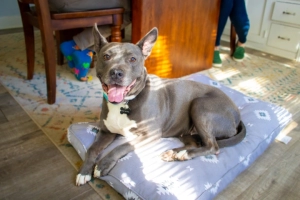Dog Poop DNA 101: Welcome to the future of pet-waste management

If Truffles (A502259) was making a playlist, the first 2 songs would be “Walking on Sunshine” by Katrina and The Waves and “Easy Like Sunday Morning” by Lionel Richie. This friendly 7-year-old pup doesn’t believe in gloomy days and always has a smile on her face. Give her something that squeaks and she will make the best of any situation. Whoever brings this girl home is going to be sitting at the top of the charts indefinitely! Truffles is eligible for a 10-day adoption trial.
So many of you enjoyed my column about pee-mail a couple of weeks ago that I find it fitting to write a follow-up about, well, poop.
Let’s start with PooPrints, the leading dog poop DNA testing company. A dog’s profile is collected via a cheek swab and registered in the DNA World Pet Registry Database.
Some home owner associations, apartment complexes and dog parks now require owners to register their dogs’ DNA before moving in or using public amenities.
When un-scooped poop is found, a sample is collected and the specimen is sent to the lab. The poop is then matched to the offending dog by their DNA. In many cases, the owner is fined.
I know it sounds hard to believe, but since the company’s commercial debut in 2011, PooPrints has signed up more than 7,000 communities in seven countries and registered more than 800,000 dogs!
Only time will tell if dog poop DNA testing is the future of pet waste management. In the meantime, I encourage you to be a good neighbor and do your part. Pick up after your pets to help ensure a healthy, sustainable community for all beings.
Dog poop can carry viruses, bacteria and parasites that are dangerous to humans and other animals. One of the more harmful viruses spread by dog feces is parvovirus, a disease that primarily affects young, unvaccinated puppies and is often fatal.
Picking up the poop is good for the environment, too. In contrast to wildlife poop, which benefits the ecosystem, pet waste has a negative impact. Dog poop adds excess nitrogen and phosphorus, creating a nutrient imbalance.
Dog poop can also end up in our waterways. This can cause harmful algae overgrowth, deplete oxygen that fish and other animals need to live and lead to bacterial contamination.
Now that you know picking up after your pet is serious business, what’s the best way to do it?
The most common way pet guardians manage clean-up is with a plastic poop bag. Poop bags are available for purchase in all pet stores, including our Pasadena Humane Shelter Shop. There are scented options to help with the smell, as well as biodegradable offerings that are better for the environment.
Many public parks and dog parks also have poop bag dispensers in case you forget your bags at home.
For those of you who desire a less hands-on approach to removing pet waste, a variety of pooper scoopers are available. These bulky solutions tend to be better for picking up waste in your yard, rather than on a walk. Just remember to always throw your dog’s waste in the regular trash can — not the green bin!
Dog poop should not be used as fertilizer and should only be composted following strict guidelines. The bacteria from dog waste can pollute your soil and contaminate your plants and vegetables. Contrary to what many dog owners think, dog poop is toxic to grass and will damage lawns over time.
In animal sheltering, poop happens…a lot. At Pasadena Humane, we even have a saying: “Don’t pass the poop.”
This rather unique motto encourages our staff members to be team players. If you walk past dog poop in a communal area, grab a poop bag and do your part. Everyone can scoop the poop, even if it’s not one of your regular job duties.
Just as it’s important for our staff to not “pass the poop,” it’s an essential part of being a responsible pet parent. And remember, scooping dog poop is more than a common courtesy; it’s the law in many places.
Dia DuVernet is president and CEO of Pasadena Humane.
This blog post originally appeared as a column in the Pasadena Star-News on March 3, 2023.


